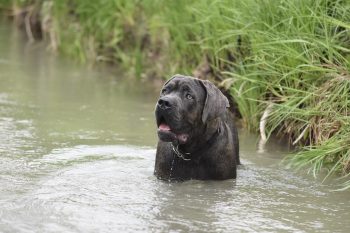Cane Corsos are a majestic and powerful breed known for their impressive physique and protective nature. Originating from Italy, they are part of the Molosser family, historically used for guarding property, hunting big game, and herding cattle. This breed combines strength, agility, and endurance, making them superb protectors and loyal companions. Despite their sometimes intimidating appearance, Cane Corsos are known for their deep bond with their family, showing a softer side in their domestic environment. Alongside their protective instincts, Cane Corsos exhibit several unusual habits that reflect their complex temperament and historical roles. These habits, while sometimes challenging, are fascinating insights into the breed’s character. This article explores seven of the most unusual habits of Cane Corsos, shedding light on each behavior and offering tips on how owners can effectively manage these distinctive traits.
1. Wariness of Strangers
Cane Corsos exhibit a pronounced wariness of strangers, a trait deeply embedded in their genetics as guard dogs. This instinct makes them excellent protectors of their homes and families, but it can pose challenges in social settings where unfamiliar people are present. Training and socialization from an early age are crucial for Cane Corsos to learn how to appropriately differentiate between threatening and non-threatening situations. Owners should introduce new people gradually and in controlled environments to help their dogs become more comfortable around strangers while still maintaining their protective nature.
2. “Perimeter Patrol” Behavior
A common yet unusual habit of Cane Corsos is their tendency to patrol the boundaries of their territory. This behavior stems from their historical use as property guardians, where they were expected to independently monitor and defend their owner’s land. In a modern residential setting, this can translate to them walking along the fence lines or the edges of the property. Encouraging this behavior in a positive way, such as through regular walks and supervised outdoor time, can help them fulfill their patrol instinct without developing territorial aggression.
3. Strong Prey Drive
Despite their size and somewhat cumbersome appearance, Cane Corsos have a strong prey drive, inherited from their days as hunters of wild game. This instinct can lead to chasing smaller animals, which can be problematic, especially in urban or suburban settings. Training to manage this prey drive is essential, and owners should engage their Cane Corsos in activities that channel their hunting instincts constructively, such as tracking or agility training, to keep this behavior under control.
4. Digging
Cane Corsos might engage in digging as part of their territorial or nesting instincts. This habit can be problematic if not managed properly, leading to destroyed gardens or dug-up lawns. Providing a designated area where digging is allowed can help manage this behavior. Additionally, ensuring they have enough physical and mental stimulation can prevent them from digging out of boredom or excess energy.
5. Vocal Communication
Cane Corsos are not excessively vocal, but they do use a range of sounds to communicate, from grunts and groans to low growls. This vocalization is not necessarily aggressive but rather a way of expressing their feelings and alerting their owners to their needs or concerns. Understanding and responding to these cues can strengthen the bond between the dog and its owner, ensuring that their communication is effective and that their needs are met.
6. Extreme Loyalty and Attachment
Cane Corsos develop an intense loyalty and attachment to their family, often becoming particularly close to one member whom they may view as their leader. This can result in protective and sometimes overprotective behavior. While this loyalty is admirable, it’s important for owners to teach their Cane Corsos that other family members and friends are not threats. Consistent training and family involvement in the dog’s care and training can help mitigate overprotectiveness.
7. Sensitivity to Change
Cane Corsos can be surprisingly sensitive to changes in their environment or routine, which can lead to stress or anxiety. This sensitivity may manifest in restlessness or behavioral changes when their daily routine is altered or when there are significant changes in their living environment. Keeping a consistent routine and gradually introducing new elements can help alleviate their stress and make transitions easier for them.
Cane Corsos are a breed with a rich history and a complex set of behaviors that require understanding and careful management. Their unusual habits, from wariness of strangers to a strong prey drive and sensitivity to change, highlight the importance of appropriate training, socialization, and routine. By addressing these habits constructively, owners can ensure that their Cane Corsos are not only well-adjusted and happy but also continue to be the noble and loyal companions they are cherished for.
The post The 7 Most Unusual Habits of Cane Corsos appeared first on iHeartDogs.com.

